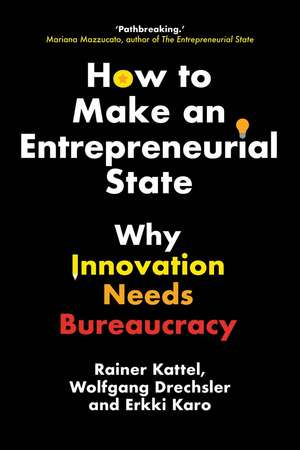How to Make an Entrepreneurial State: Why Innovation Needs Bureaucracy
Autor Rainer Kattel, Wolfgang Drechsler, Erkki Karoen Limba Engleză Hardback – 13 sep 2022
A groundbreaking account which shows how the public sector must adapt, but also persevere, in order to advance technology and innovation
From self-driving cars to smart grids, governments are experimenting with new technologies to significantly change the way we live. Innovation has become vitally important to states across the world.
Rainer Kattel, Wolfgang Drechsler, and Erkki Karo explore how public bodies pursue innovation, looking at how new policies are designed and implemented. Spanning Europe, the USA and Asia, the authors show how different institutions finance new technologies and share cutting-edge information. They argue for the importance of “agile stability,” demonstrating that in order to successfully innovate, state organizations have to move nimbly like start-ups and yet ensure stability at the same time. And that, particularly in the light of the Covid-19 pandemic, governments need both long-term policy and dynamic capabilities to handle crises.
This vital account explores the complex and often contradictory positions of innovating public bodies—and shows how they can overcome financial and political resistance to change for the good of us all.
Preț: 155.57 lei
Nou
Puncte Express: 233
Preț estimativ în valută:
29.77€ • 30.97$ • 24.58£
29.77€ • 30.97$ • 24.58£
Carte disponibilă
Livrare economică 25 martie-08 aprilie
Livrare express 08-14 martie pentru 27.58 lei
Preluare comenzi: 021 569.72.76
Specificații
ISBN-13: 9780300227277
ISBN-10: 0300227272
Pagini: 288
Dimensiuni: 152 x 235 x 28 mm
Greutate: 0.46 kg
Editura: Yale University Press
Colecția Yale University Press
ISBN-10: 0300227272
Pagini: 288
Dimensiuni: 152 x 235 x 28 mm
Greutate: 0.46 kg
Editura: Yale University Press
Colecția Yale University Press
Recenzii
“The ghost of Max Weber hovers over this thought-provoking volume. . . . Kattel, Drechsler, and Karo take us on a journey that spans time and geography to explore the seeming oxymoron of innovative bureaucracy. . . . The book holds particular relevance in the current moment.”—Ron Adner, Administrative Science Quarterly
“Provides a fresh, thought-provoking, and unique perspective on the relationship between bureaucracy and innovation, setting it apart from other books in the field. . . . Will undoubtedly stand as a valuable resource.”—Alexandre de Ávila Gomide, Max Weber Studies
Winner of the George R. Terry Book Award, sponsored by the Academy of Management
“For too long state bureaucracies have been associated negatively with stasis, inertia, complexification, and resistance to change. But in fact—as this pathbreaking book shows—bureaucracies can be shaped creatively and in doing so become the key to dynamism, innovation and creativity. . . . We need to think bigger—and what better book for bigger thinking?”—Mariana Mazzucato, author of The Entrepreneurial State
“This book uses history to radically change the meaning of bureaucracy, from inertial and stiff to agile and innovative. It’s precisely the change that current government structures must make to face the challenges of climate change and inequality in the Information Era. A must read for anyone interested in building a better future.”—Carlota Perez, author of Technological Revolutions and Financial Capital
“This important book breaks new ground by arguing that not only is the state not deleterious to entrepreneurship, but it actually is a pre-requisite for igniting a robust and dynamic entrepreneurial society. This book will change thinking about the fundamental roles of government, business and society.”—David B. Audretsch, author of The Entrepreneurial Society
“Defying timeworn stereotypes of bureaucracy, Kattel, Drechsler and Karo offer a fresh perspective on the state’s pivotal role in societal progress. Their pioneering book will be essential to both those who want to understand, and those who want to realize the great transformations of our time.”—Caspar van den Berg, Leiden University
“Bureaucracy plays a dual role in creating innovation in society and business. On the one hand, the bureaucracy is required to be an enabler in various changes in society through various policies and activities, on the other hand the bureaucracy must also be able to change itself in the midst of various regulatory rigidities. This book is very good at telling these two things and being an inspiration for practitioners, academics and students who are deep in bureaucracy.”—Eko Prasojo, University of Indonesia
“Provides a fresh, thought-provoking, and unique perspective on the relationship between bureaucracy and innovation, setting it apart from other books in the field. . . . Will undoubtedly stand as a valuable resource.”—Alexandre de Ávila Gomide, Max Weber Studies
Winner of the George R. Terry Book Award, sponsored by the Academy of Management
“For too long state bureaucracies have been associated negatively with stasis, inertia, complexification, and resistance to change. But in fact—as this pathbreaking book shows—bureaucracies can be shaped creatively and in doing so become the key to dynamism, innovation and creativity. . . . We need to think bigger—and what better book for bigger thinking?”—Mariana Mazzucato, author of The Entrepreneurial State
“This book uses history to radically change the meaning of bureaucracy, from inertial and stiff to agile and innovative. It’s precisely the change that current government structures must make to face the challenges of climate change and inequality in the Information Era. A must read for anyone interested in building a better future.”—Carlota Perez, author of Technological Revolutions and Financial Capital
“This important book breaks new ground by arguing that not only is the state not deleterious to entrepreneurship, but it actually is a pre-requisite for igniting a robust and dynamic entrepreneurial society. This book will change thinking about the fundamental roles of government, business and society.”—David B. Audretsch, author of The Entrepreneurial Society
“Defying timeworn stereotypes of bureaucracy, Kattel, Drechsler and Karo offer a fresh perspective on the state’s pivotal role in societal progress. Their pioneering book will be essential to both those who want to understand, and those who want to realize the great transformations of our time.”—Caspar van den Berg, Leiden University
“Bureaucracy plays a dual role in creating innovation in society and business. On the one hand, the bureaucracy is required to be an enabler in various changes in society through various policies and activities, on the other hand the bureaucracy must also be able to change itself in the midst of various regulatory rigidities. This book is very good at telling these two things and being an inspiration for practitioners, academics and students who are deep in bureaucracy.”—Eko Prasojo, University of Indonesia
Notă biografică
Rainer Kattel is professor and deputy director at the UCL Institute for Innovation and Public Purpose. Wolfgang Drechsler is honorary professor at the UCL Institute for Innovation and Public Purpose and professor of governance at the Nurkse Department of Innovation and Governance at TalTech, as well as associate at Harvard University’s Davis Center. Erkki Karo is associate professor and head of department at the Nurkse Department of Innovation and Governance at TalTech.
Descriere
A groundbreaking account which shows how the public sector must adapt, but also persevere, in order to advance technology and innovation























